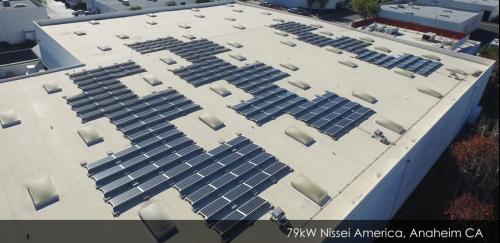The Benefits of Solar Power to Environment

Solar power has dynamic and huge potential to save thousands of people over life of a residential solar power system. But the environmental benefits are far more than the financial benefits of solar power. With solar power, your home makes use of this renewable energy which is clean and has negligible impact on the environment. The emissions, water, and land use are saved by just a single home using solar power are greater. For a few homes, using solar power as a source of electricity is like planting as many as around 2,500 trees. Go ahead and read further to know why solar power is a superior environmental choice and why it benefits the environment.
Coal produced electricity generates tons of carbon dioxide, also known as CO2. It is a greenhouse gas that warms the climate. Global warming leads to changes around the world in the atmosphere, on land, and in the oceans.This causes ice to melt, sea levels to rise, and increased precipitation. This also translates into a large decline of animal populations, movement of habitats to cooler areas, and stronger weather impacts including hurricanes, floods, and droughts. The single largest source of CO2 emissions is the generation of electricity. Electricity that powers homes, businesses, and industry accounts for 37% of CO2 emissions which is greater than the 31% of CO2 emissions generated by transportation and the 15% of CO2 emissions emitted by industry processes. Say if you have a residential solar power system and an electric car powered by your home, you could just wipe out nearly 70% of your environmental impact, reducing both the electricity emissions and transportation emissions.
Renewable energy comes from inexhaustible sources such as solar, wind, geothermal, bioenergy, and water. With these sources, one doesn’t have to worry about someday running out of wind, or losing the sun. Using renewable energy such as solar power, your electricity generation takes nothing away from the environment. This is in direct contrast to fossil fuels that are limited and cause direct damage to the environment when consumed. The sun will continue to shine whether you use it for solar power or not — and that makes this renewable energy source completely different from fossil fuels and other non-renewable energy sources.
Solar power captures the inexhaustible supply of energy with practically no impact on the environment which means that solar power is far easier on carbon emissions, water, land use, and health impacts than the typical electricity generated by coal or natural gas in fossil fuel energy plants. There are negative impacts on the environment associated with solar power. Solar power impacts the environment by using land, water, and hazardous materials, although, the impacts are minimal for solar power, especially when compared to the environmental impact of fossil fuel energy. Solar power is easy on water and land use and other environmental impacts. Compared with coal electricity, solar electricity uses 86% to 89% less water. It also uses 80% less land. Solar power is 95% lower in toxicity to humans, causes 92% to 97% less acid rain, and 97% to 98% less marine eutrophication, the cause of algal blooms.
As you generate solar power for your home, you’re not just creating sustainable energy. Using solar power, you’re reducing your electricity demand on the grid. That means the grid doesn’t have to work as hard to meet electricity needs, reducing brownouts or blackouts, not to mention reducing your community’s dependence on fossil fuels for electricity. Also, solar power environmental savings happens whether you use all of your solar power or not.
We at Xsunx offer commercial, residential solar panel installation services in Orange County, California, San Diego, Los Angeles.
Advertise on APSense
This advertising space is available.
Post Your Ad Here
Post Your Ad Here





Comments